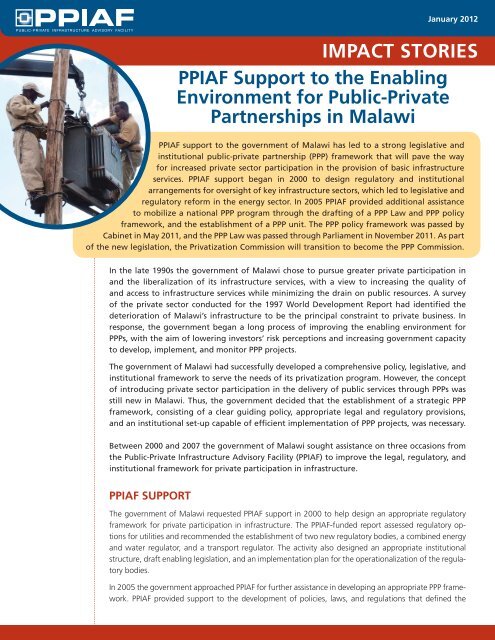PMR cover.psd - ppiaf
PMR cover.psd - ppiaf
PMR cover.psd - ppiaf
You also want an ePaper? Increase the reach of your titles
YUMPU automatically turns print PDFs into web optimized ePapers that Google loves.
PUBLIC-PRIVATE INFRASTRUCTURE ADVISORY FACILITY<br />
January 2012<br />
IMPACT STORIES<br />
PPIAF Support to the Enabling<br />
Environment for Public-Private<br />
Partnerships in Malawi<br />
PPIAF support to the government of Malawi has led to a strong legislative and<br />
institutional public-private partnership (PPP) framework that will pave the way<br />
for increased private sector participation in the provision of basic infrastructure<br />
services. PPIAF support began in 2000 to design regulatory and institutional<br />
arrangements for oversight of key infrastructure sectors, which led to legislative and<br />
regulatory reform in the energy sector. In 2005 PPIAF provided additional assistance<br />
to mobilize a national PPP program through the drafting of a PPP Law and PPP policy<br />
framework, and the establishment of a PPP unit. The PPP policy framework was passed by<br />
Cabinet in May 2011, and the PPP Law was passed through Parliament in November 2011. As part<br />
of the new legislation, the Privatization Commission will transition to become the PPP Commission.<br />
In the late 1990s the government of Malawi chose to pursue greater private participation in<br />
and the liberalization of its infrastructure services, with a view to increasing the quality of<br />
and access to infrastructure services while minimizing the drain on public resources. A survey<br />
of the private sector conducted for the 1997 World Development Report had identifi ed the<br />
deterioration of Malawi’s infrastructure to be the principal constraint to private business. In<br />
response, the government began a long process of improving the enabling environment for<br />
PPPs, with the aim of lowering investors’ risk perceptions and increasing government capacity<br />
to develop, implement, and monitor PPP projects.<br />
The government of Malawi had successfully developed a comprehensive policy, legislative, and<br />
institutional framework to serve the needs of its privatization program. However, the concept<br />
of introducing private sector participation in the delivery of public services through PPPs was<br />
still new in Malawi. Thus, the government decided that the establishment of a strategic PPP<br />
framework, consisting of a clear guiding policy, appropriate legal and regulatory provisions,<br />
and an institutional set-up capable of effi cient implementation of PPP projects, was necessary.<br />
Between 2000 and 2007 the government of Malawi sought assistance on three occasions from<br />
the Public-Private Infrastructure Advisory Facility (PPIAF) to improve the legal, regulatory, and<br />
institutional framework for private participation in infrastructure.<br />
PPIAF SUPPORT<br />
The government of Malawi requested PPIAF support in 2000 to help design an appropriate regulatory<br />
framework for private participation in infrastructure. The PPIAF-funded report assessed regulatory options<br />
for utilities and recommended the establishment of two new regulatory bodies, a combined energy<br />
and water regulator, and a transport regulator. The activity also designed an appropriate institutional<br />
structure, draft enabling legislation, and an implementation plan for the operationalization of the regulatory<br />
bodies.<br />
In 2005 the government approached PPIAF for further assistance in developing an appropriate PPP framework.<br />
PPIAF provided support to the development of policies, laws, and regulations that defi ned the

















